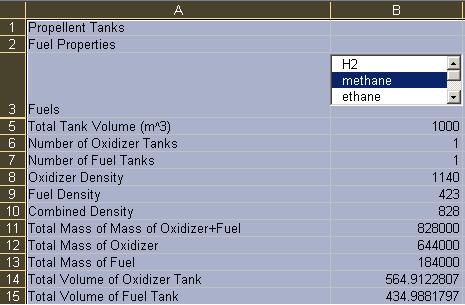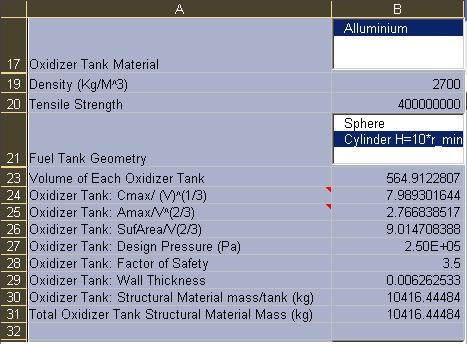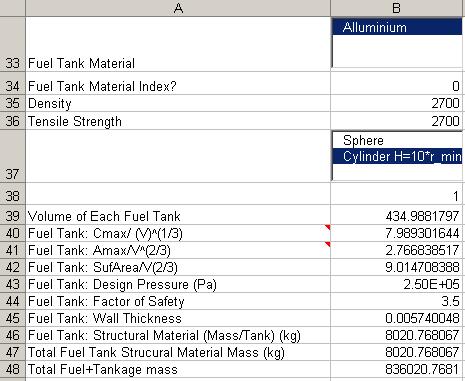Difference between revisions of "RocketDesignSpreadsheet"
| Line 1: | Line 1: | ||
| − | + | == Introduction == | |
| + | |||
| + | The RocketDesignSpreadsheet was a spread sheet created by John Creighton with some help form Jumpboy for the purposes of trying to obtain better dry mass estimates, so that rocket performance (i.e. Mass Ratio) can be better calculated. The spreadsheet can be downloaded here: | ||
http://www.geocities.com/s243a/mars/rocketDesignSpreadsheet.xls | http://www.geocities.com/s243a/mars/rocketDesignSpreadsheet.xls | ||
| − | + | The spreadsheet is described in further detail bellow. It is designed so you can make high level changes such as tank volume and overall thrust to mass ratio and it will scale the details of the rocket accordingly. This will let the user answer questions like: | |
| + | |||
| + | -Do we can much efficiency in terms of ratio ratio by increasing the size of the rocket? | ||
| + | -How do low thrust high ISP rockets compare to high thrust low ISP rockets.? | ||
| + | -Are gravity losses a significant factor? | ||
| + | |||
| + | The Details are described further bellow. | ||
== Section 1 Tank Volumes and Fuel Mass == | == Section 1 Tank Volumes and Fuel Mass == | ||
| + | |||
| + | In the first part of the spread sheet you specify the tank volume and you select the fuel you want to use via a selection box. This value selected outputs an index of the selected value in the cell bellow the selection box. This cell is hidden. Cells further down uses this index to look up the values of the fuel and oxidizer density. You can also specify the number of fuel and the number of oxidizer tanks. The remain calculations, calculate the total volume of each tank, the total fuel/oxidizer mass contained in each tanke and the total mass of the fuel and the oxidizer. | ||
| + | |||
[[Image:RDS-Sec1-Tank-Volumes-And-Fuel-Mass.JPG]] | [[Image:RDS-Sec1-Tank-Volumes-And-Fuel-Mass.JPG]] | ||
Revision as of 00:23, 13 August 2009
Contents
Introduction
The RocketDesignSpreadsheet was a spread sheet created by John Creighton with some help form Jumpboy for the purposes of trying to obtain better dry mass estimates, so that rocket performance (i.e. Mass Ratio) can be better calculated. The spreadsheet can be downloaded here:
http://www.geocities.com/s243a/mars/rocketDesignSpreadsheet.xls
The spreadsheet is described in further detail bellow. It is designed so you can make high level changes such as tank volume and overall thrust to mass ratio and it will scale the details of the rocket accordingly. This will let the user answer questions like:
-Do we can much efficiency in terms of ratio ratio by increasing the size of the rocket? -How do low thrust high ISP rockets compare to high thrust low ISP rockets.? -Are gravity losses a significant factor?
The Details are described further bellow.
Section 1 Tank Volumes and Fuel Mass
In the first part of the spread sheet you specify the tank volume and you select the fuel you want to use via a selection box. This value selected outputs an index of the selected value in the cell bellow the selection box. This cell is hidden. Cells further down uses this index to look up the values of the fuel and oxidizer density. You can also specify the number of fuel and the number of oxidizer tanks. The remain calculations, calculate the total volume of each tank, the total fuel/oxidizer mass contained in each tanke and the total mass of the fuel and the oxidizer.
Section 2 Tank Structure Mass
Sec_3-Fuel-Tank-Structure-Mass
Sec 4 Rocket Performance
Mass Breakdown of a rocket
A simple estimate of the rocket mass breakdown was given in [1].
Mass [kg]
Total mass 375
Propellant 300
Tankage system 57
Thrusters + plumbing 10.75
Miscellaneous 7.25
As you can see the majority of the rocket weight is in fuel.
Other Relevent Spreadsheets
http://www.paul.enutrofal.com/
Refferences
[1] http://www.lr.tudelft.nl/live/pagina.jsp?id=3784708c-c434-47f7-ae49-6f1f1d0d7114&lang=en - Gives The Mass Breakdown of a rocket.
[2] http://dunnspace.com/alternate_ssto_propellants.htm - Information about the rocket propellents was gathered here.
[3] http://en.wikipedia.org/wiki/Mass_ratio#Examples Contains a nice table for the mass ratio's of several rockets.



